Healthcare data management means collecting, storing, and using health information to improve care and operations. In 2025, healthcare data management grows more important as the global market is set to reach USD 6.28 billion, with strong growth expected in Asia Pacific.
| Metric | Value |
|---|---|
| Market size in 2025 | USD 6.28 billion |
| Compound Annual Growth Rate | 14.35% |
| Fastest growing region | Asia Pacific |
You see the effects of healthcare data management every day:
Advanced technologies and strong data strategies, like those offered by FanRuan and FineReport, help you manage health data with confidence.
You interact with healthcare data management every time you visit a doctor, fill a prescription, or check your health records online. This process involves collecting, storing, integrating, and analyzing health information to support better care and efficient operations. Healthcare data management helps you and your providers make informed decisions, protect your privacy, and improve the quality of care. As healthcare systems grow more complex, you need reliable management to keep your health information accurate and secure.
Tip: Strong healthcare data management ensures your health records stay safe and accessible when you need them most.
Healthcare data comes in many forms. Each type plays a unique role in your care and the operation of healthcare systems. The industry classifies healthcare data based on sensitivity and regulatory needs. Here are the main categories:
Healthcare organizations must handle each category with care to meet legal and ethical standards.
A strong healthcare data management system relies on several key parts. These components work together to keep your health information organized, safe, and useful:
When these components function well, you benefit from better care, smoother operations, and greater trust in healthcare systems.
You experience the benefits of healthcare data management every time you receive care. Accurate and timely data helps your doctor make better decisions about your treatment. Health information technology, such as electronic medical records and computerized order entry systems, reduces medical errors and improves patient safety. Studies show that these systems can cut medication errors by more than half and increase how often doctors follow clinical guidelines. When your health data is managed well, you get safer care and better outcomes.
Big data impact on healthcare continues to grow. Hospitals now collect information from many sources, including lab results, imaging, and even wearable devices. This data helps your care team see the full picture of your health. Advanced solutions use artificial intelligence to predict risks and suggest the best treatments. You benefit from fewer mistakes, faster diagnoses, and more personalized care. As healthcare organizations adopt new technologies, you can expect even better patient outcomes and a higher standard of safety.
Note: Effective healthcare data management means your health records are not just stored—they are used to improve your care and protect your well-being.
Healthcare organizations face more data than ever before. The volume and complexity of healthcare data have increased with new sources like genomics, social factors, and unstructured notes. Big data impact on healthcare means hospitals and clinics must process and analyze huge amounts of information quickly. When you visit a clinic, efficient data systems help reduce your wait time and make sure you get the right care at the right moment.
You see the results of operational efficiency in many ways:
Healthcare organizations measure these improvements by tracking wait times, error rates, and staff productivity. They use process mapping and real-time analytics to spot bottlenecks and make changes. Big data impact on healthcare also means faster processing of health records, shorter hospital stays, and better use of resources. You benefit from a system that works smarter, not harder.
Tip: Integrated solutions like those from FanRuan help unify data from different sources, making healthcare operations more efficient and responsive.
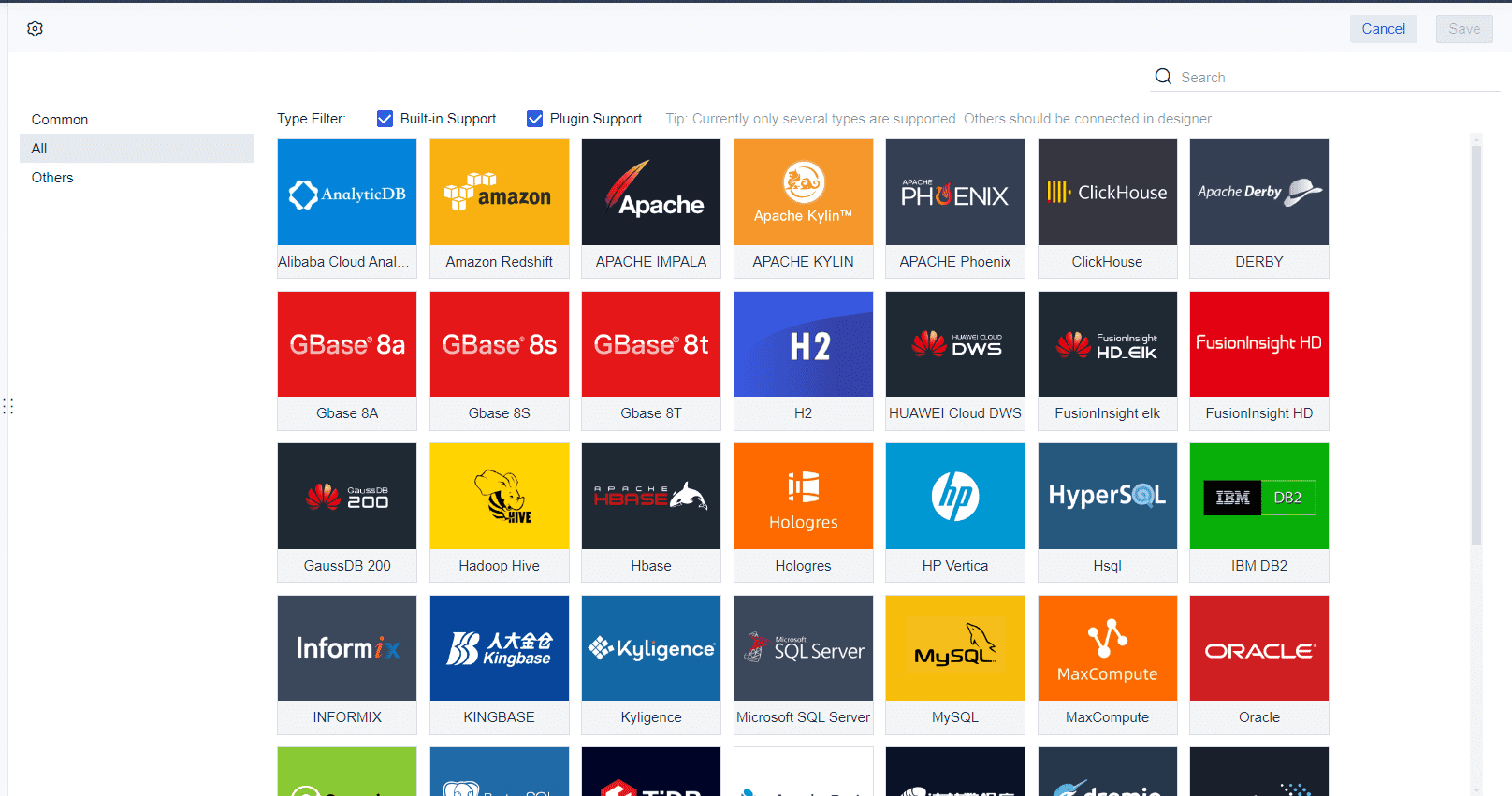
In 2025, healthcare organizations must meet strict regulatory compliance standards. Laws like HIPAA, GDPR, and the CCPA require you to protect patient privacy, secure health data, and report breaches quickly. These rules shape how healthcare organizations manage and share your information. Evolving regulatory standards demand that you use advanced safeguards, regular audits, and strong access controls.
You need to follow frameworks that combine multiple regulations, such as HITRUST CSF, to simplify compliance and maintain high data quality. Regulatory compliance strategies include encrypting data, training staff, and using secure cloud solutions. As more states and countries create new privacy laws, you must adapt your data management practices. Big data impact on healthcare means you handle more unstructured data, which requires new privacy-preserving technologies.
Healthcare organizations that meet these requirements build trust with patients and partners. You show that you value privacy, security, and transparency. By embedding compliance into daily operations, you reduce risks and prepare for future challenges.
Callout: Staying ahead of evolving regulatory standards ensures your healthcare organization remains resilient and trustworthy in a changing world.
You gain many advantages when you use advanced healthcare data management. With strong systems, you get a complete view of your health, your family’s health, and even larger patient groups. This helps you track health status and spot trends early. You receive reminders and care suggestions based on predictive models, which keep you engaged and proactive about your well-being.
Healthcare organizations use data-driven insights to improve outcomes. They can track health trends, predict new issues, and suggest steps to prevent problems. You see better results because doctors use real-time data to make decisions. Data-driven decision-making supports early risk identification and personalized treatments. Hospitals have reduced preventable readmissions and improved preventive care by using these methods.
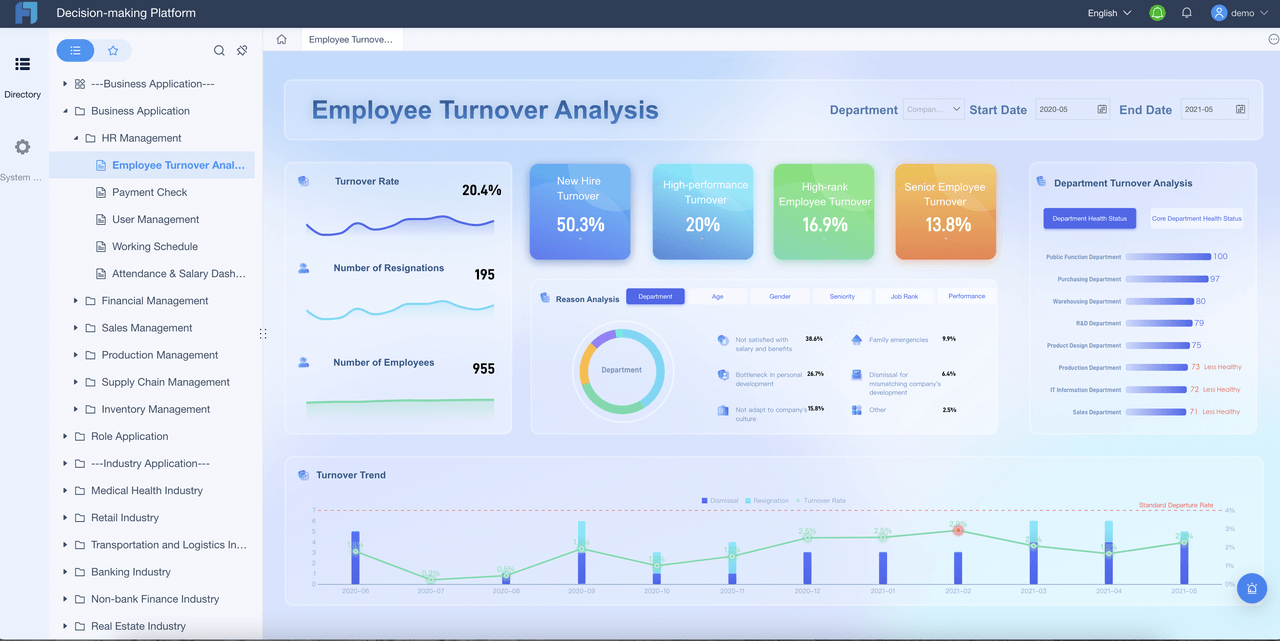
You also benefit from improved operational efficiency. Automated systems optimize resource allocation, manage patient flow, and reduce errors. Real-time monitoring through dashboards lets you and your care team track key performance indicators, such as physician productivity and patient experience. These insights help you get the right care at the right time.
Tip: Data-driven healthcare supports better clinical and financial outcomes, helping you and your providers make smarter choices.
You face several challenges in healthcare data management. Data silos often keep information locked in separate systems, making it hard to get a full picture of your health. Outdated infrastructure and legacy systems limit scalability as data volume grows. Security and compliance remain top concerns. You must protect sensitive health data with encryption, access controls, and audit trails to meet strict compliance standards.
Scalability issues can slow down your ability to process and analyze large amounts of health data. High costs and limited resources make it harder to upgrade systems. Real-time monitoring and integration become difficult without modern solutions. You need to follow best practices, such as modular system design and continuous security monitoring, to keep your data safe and accessible.
FanRuan and FineReport help you overcome these challenges. Their integrated solutions connect multiple healthcare applications, support real-time data synchronization, and provide secure, scalable storage. With built-in compliance tools and automated monitoring, you can focus on improving health outcomes and maintaining high data quality.
You see rapid changes in healthcare technology. Real-time analytics and automation now shape how you manage data. With real-time data integration, you access information instantly from wearable devices, EHR systems, and IoT medical tools. This supports faster clinical decisions and early detection of health events. Real-time monitoring lets you spot risks quickly and trigger alerts for emergencies. AI-powered analytics help you personalize treatment plans and forecast patient trends. Automation reduces errors by handling tasks like claims processing, appointment scheduling, and inventory management. You save time and improve patient satisfaction. Natural language processing turns unstructured clinical notes into structured data, giving you deeper insights and better outcomes.
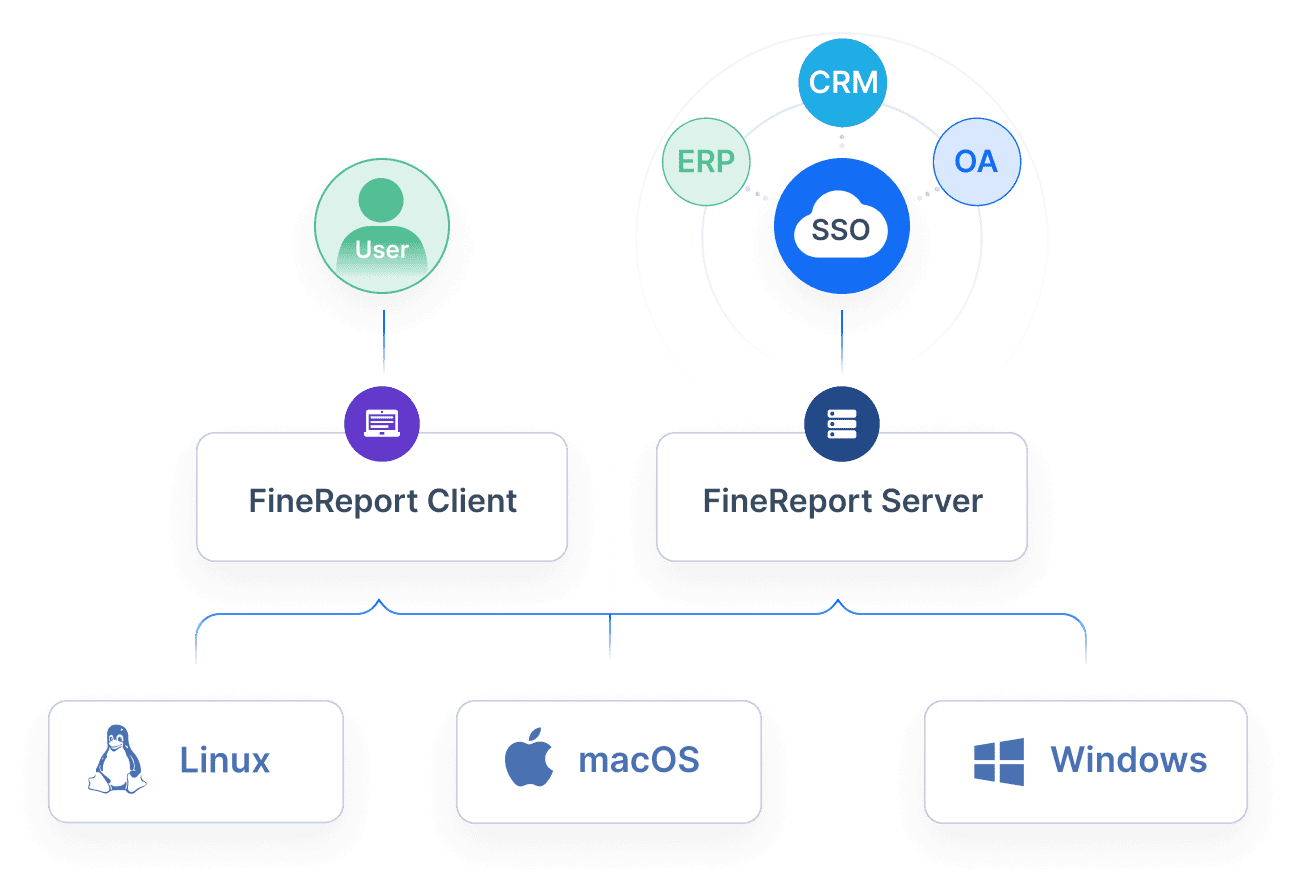
You must follow strict compliance rules to protect patient information. HIPAA, GDPR, and ISO standards guide you in keeping data secure. HIPAA stands out for its focus on healthcare security. You use role-based access control, consent management, and data anonymization to protect privacy. Blockchain technology adds transparency and strengthens compliance by creating secure audit trails. You also need strong security measures, such as AES-256 encryption and multi-factor authentication. Regular audits, employee training, and incident response plans help you stay ahead of threats. Maintaining data quality means setting clear standards for accuracy, completeness, and timeliness. You conduct audits, cross-validate data, and use IoT devices for real-time data capture. Adopting HL7 and FHIR standards improves data integration and interoperability across systems.
| Aspect | Best Practices and Recommendations |
|---|---|
| Data Quality | Set standards for accuracy, completeness, and timeliness. Audit data, cross-validate, and use central repositories. |
| Data Security & Privacy | Use HIPAA, access controls, encryption, and employee education. Plan for incidents and update software regularly. |
| Interoperability | Adopt HL7 and FHIR standards for seamless data exchange. |
| Governance & Compliance | Create clear policies, assign data ownership, and use frameworks like COBIT and NIST. |
| Emerging Technologies | Use AI, cloud computing, and IoT to automate and improve reliability. |
Tip: Strong compliance and security practices build trust and keep your healthcare organization resilient.
FanRuan and FineReport give you powerful tools for healthcare data management. You can connect multiple data sources, automate reporting, and visualize key metrics. These solutions support real-time monitoring and data-driven insights, helping you make better decisions.
You can track medicine usage in real time with FineReport dashboards. This lets you monitor inventory, spot trends, and prevent shortages. Automated alerts help you manage stock and reduce waste. You gain insights into prescribing patterns, which supports compliance and improves patient safety.
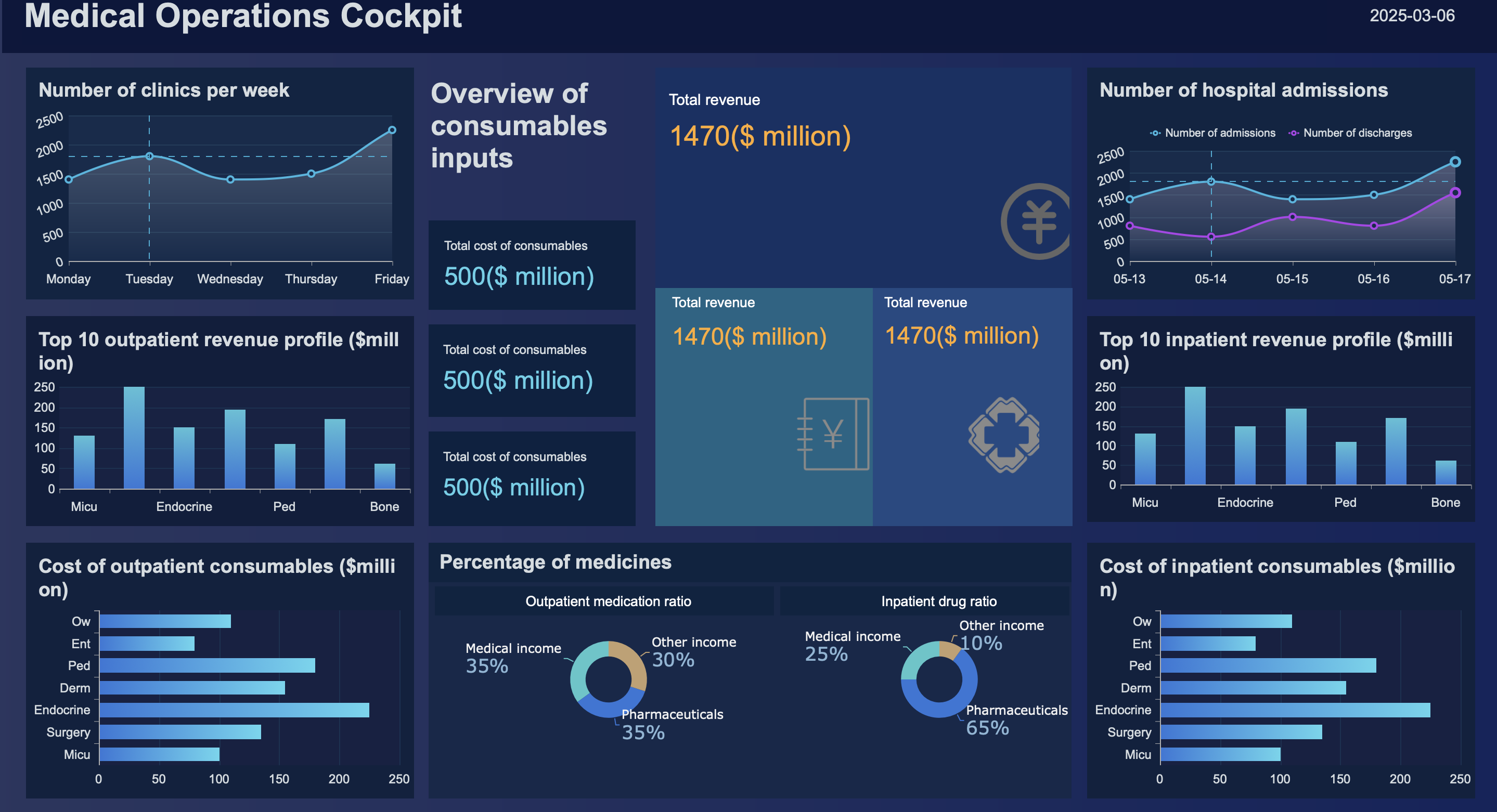
FineReport enables you to build operation dashboards that show real-time data on patient flow, staff allocation, and resource use. You see key performance indicators at a glance. Real-time analytics help you identify bottlenecks and optimize operations. With these solutions, you improve efficiency and maintain high data quality across your healthcare organization.
Note: FanRuan's healthcare solutions empower you to unify data, enhance integration, and drive better outcomes through real-time analytics and monitoring.
You will see major changes in how you handle data in healthcare. By 2025, you can expect a unified, scalable data foundation built on cloud technology. This foundation helps you manage huge amounts of structured and unstructured data. You will use standardized data pipelines and strong governance to keep your data accurate and secure. Cloud migration lets you store and process data efficiently, even as your needs grow.
Healthcare organizations are moving toward federated operating models. These models let teams work with data directly, making decisions faster and encouraging innovation. You will notice that AI and analytics do more than just cut costs. They help you grow by supporting personalized medicine and digital twins for simulating operations. True interoperability will allow you to connect data from many sources, improving care and coordination.
Generative AI will play a big role. You will use it for diagnostics, patient flow, and administrative tasks. It can generate predictive insights from real-time data, helping you spot risks early. For example, automated coding and census prediction will become common. Responsible AI and better data governance will keep your data private and secure. You will also see more intelligent automation, IoT integration, and AI agents that support documentation and virtual nursing.
Tip: Embrace real-time analytics and automation to unlock the full potential of your data and improve patient care.
You need to get ready for new challenges in data management. Start by cleaning up duplicate records and building strong data quality frameworks. Break down data silos using integration platforms that unify your data and support a data-driven culture. Make sure your systems can handle real-time data integration and automate data profiling to keep quality high.
To stay compliant, use role-based access controls, encryption, and HIPAA-compliant technologies. Modern data platforms give you transparency and automate many tasks, reducing errors and speeding up processes. You should conduct routine audits and use scalable validation to keep your data accurate. Invest in healthcare-specific solutions to meet changing regulations.
Adopt a single source of truth to unify data across departments. This reduces redundancy and improves reliability. Effective data integration strategies ensure interoperability and make your data accessible when you need it. Remove data silos and automate tasks to streamline management. Master data management keeps your information unified and accurate.
You can ensure long-term adaptability by using standardized formats and scalable infrastructure. Secure your data throughout its lifecycle to maintain trust. The Adaptive Healthcare Organization model helps you stay flexible and make quick decisions. Open communication and real-time feedback let you respond to new issues fast. Encourage innovation and learn from mistakes to keep improving. Always maintain enough resources and support your staff to stay ready for any challenge.
Note: By focusing on real-time data capture, integration, and monitoring, you prepare your organization for a future where data drives every decision.
You play a key role in shaping healthcare data management for 2025. Advanced solutions like FanRuan and FineReport help you boost efficiency, secure sensitive data, and adapt to new technologies.
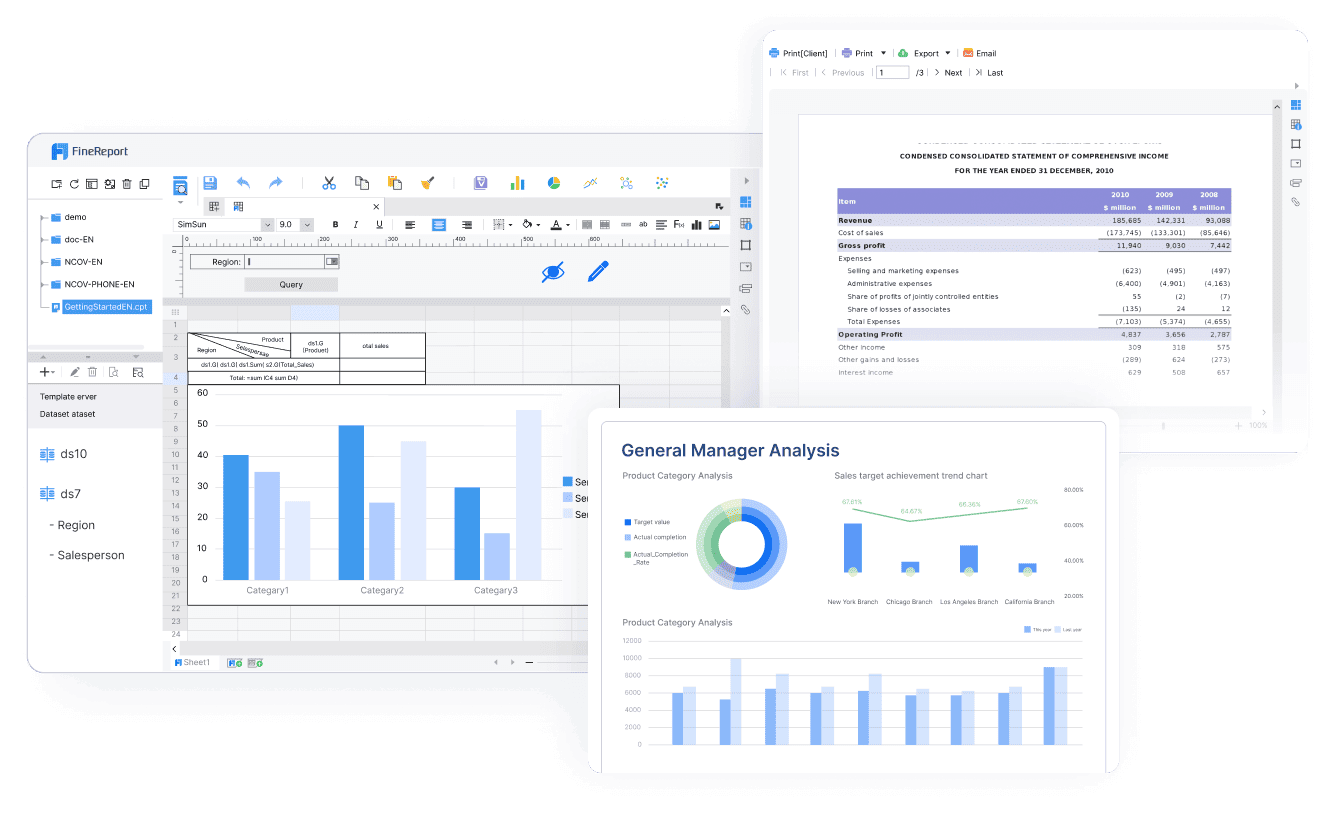
| Reason to Adopt Best Practices | Impact |
|---|---|
| Improving Patient Care Quality | Faster, safer care and better outcomes |
| Security & Privacy | Strong protection for patient data |
Stay ready for the future by choosing flexible, secure, and integrated systems.
Click the banner below to try FineReport for free and empower your enterprise to transform data into productivity!

The Author
Lewis
Senior Data Analyst at FanRuan
Related Articles
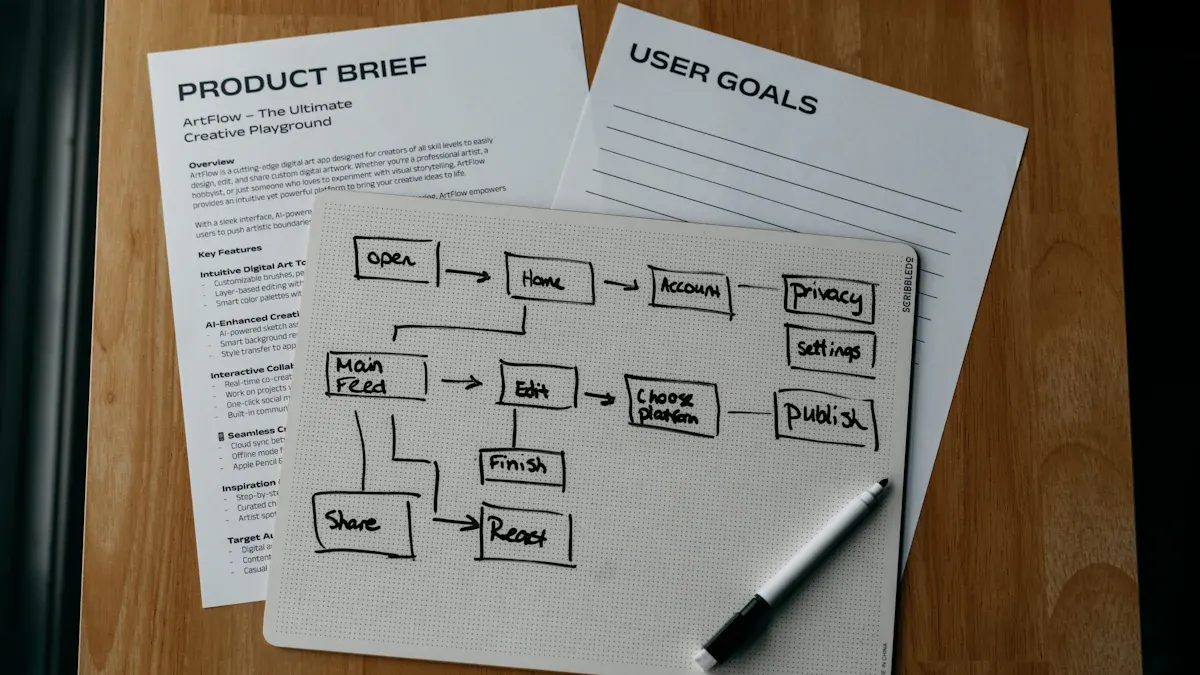
What is a data management platform in 2025
A data management platform in 2025 centralizes, organizes, and activates business data, enabling smarter decisions and real-time insights across industries.
Howard
Dec 22, 2025

Top 10 Database Management Tools for 2025
See the top 10 database management tools for 2025, comparing features, security, and scalability to help you choose the right solution for your business.
Howard
Dec 17, 2025
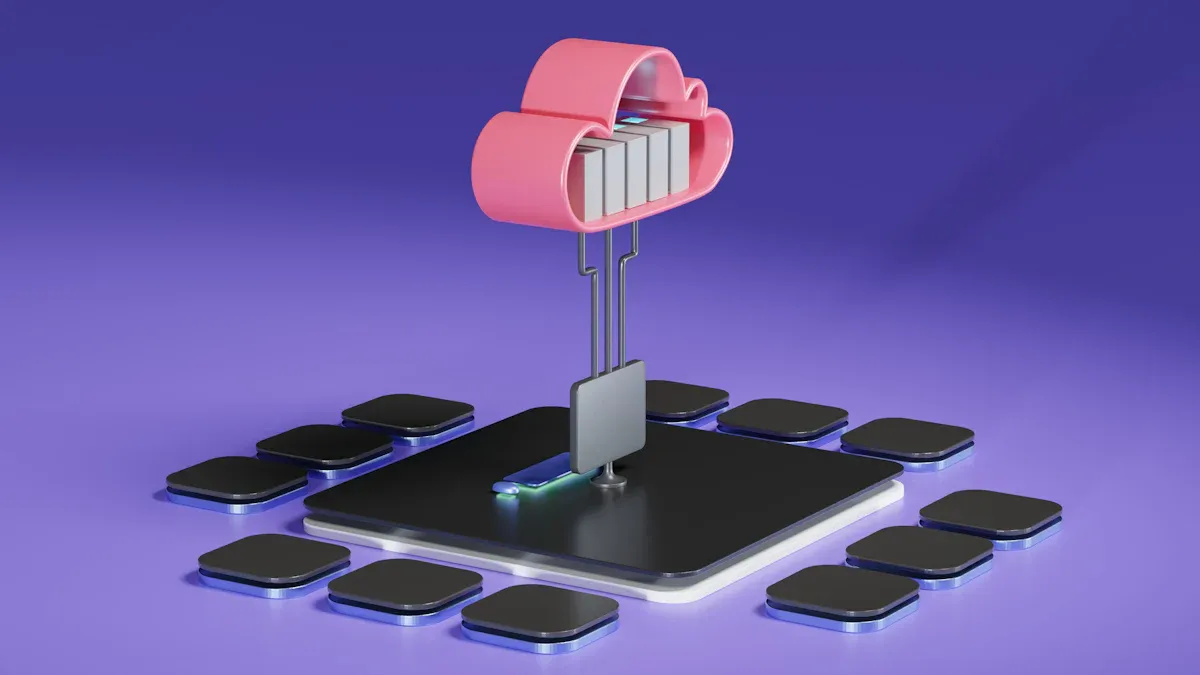
Best Data Lake Vendors For Enterprise Needs
Compare top data lake vendors for enterprise needs. See which platforms offer the best scalability, integration, and security for your business.
Howard
Dec 07, 2025